With the rapid advancement of technology, our everyday lives have become increasingly intertwined with smart and efficient devices. One such innovation that has significantly impacted our comfort and convenience is the contact thermostat. In this article, we will explore the world of contact thermostats, their functionality, benefits, and how they are shaping the way we manage temperature control in our homes and workplaces.

What Is a Contact Thermostat? A contact thermostat is a specialized temperature control device designed to maintain a specific temperature by directly sensing and regulating the environment it’s placed in. Unlike traditional thermostats that rely on indirect temperature measurements, such as air temperature, contact thermostats have the unique capability of directly interacting with the object or substance they are tasked to control. This distinction is what sets them apart and makes them particularly effective in various applications. How Contact Thermostats Work Contact thermostats work based on the principle of thermal conductivity. They are equipped with a sensor, typically made of materials like bimetallic strips or thermistors, which change their properties in response to temperature fluctuations. When the sensor detects a deviation from the desired temperature, it triggers a response to bring the temperature back to the set point. For example, in household applications like ovens and refrigerators, contact thermostats regulate the temperature by physically coming into contact with the heating or cooling element. When the temperature deviates from the desired range, the thermostat adjusts the power supplied to the heating or cooling element, ensuring that the temperature remains stable. Benefits of Contact Thermostats Contact thermostats offer several advantages over their traditional counterparts: Precision: Contact thermostats provide precise temperature control as they directly measure the temperature of the target object, eliminating the lag associated with air temperature-based thermostats. Energy Efficiency: They are highly energy-efficient since they respond directly to temperature changes, reducing energy consumption and minimizing temperature fluctuations. Reliability: Contact thermostats are known for their reliability and durability, making them suitable for long-term use in various environments. Versatility: These thermostats can be employed in a wide range of applications, including industrial processes, scientific research, and home appliances. Customization: Users can easily set and customize the desired temperature range for their specific needs, ensuring optimal comfort and efficiency. Applications of Contact Thermostats Contact thermostats find applications in various fields: Home Appliances: They are commonly used in ovens, refrigerators, and water heaters to maintain precise temperature control. Laboratory Equipment: Contact thermostats are essential in scientific research, ensuring accurate and consistent conditions in experiments. Industrial Processes: Industries rely on contact thermostats for processes like chemical reactions, metallurgy, and manufacturing, where temperature control is critical. Medical Devices: Medical equipment, such as incubators and blood storage units, employ contact thermostats to safeguard temperature-sensitive materials. Environmental Control: They play a crucial role in maintaining optimal conditions in greenhouses, ensuring the growth of plants and crops. The Future of Contact Thermostats As technology continues to advance, contact thermostats are likely to become even more sophisticated and integrated into our daily lives. With the growing emphasis on energy conservation and sustainability, their precision and efficiency make them invaluable tools for minimizing energy waste and reducing carbon footprints. In conclusion, contact thermostats have emerged as game-changers in the world of temperature control. Their ability to directly interact with the objects they regulate, coupled with their precision and versatility, has made them indispensable in various sectors. As we move towards a more interconnected and energy-conscious future, contact thermostats are poised to play a pivotal role in enhancing our comfort, efficiency, and environmental responsibility.